
A sign outside Monroe, Georgia, shows support for Donald Trump’s 2024 campaign. Photograph: Jesse Pratt López/The Guardian
Monroe county, Georgia, where Donald Trump won 74% of the vote, is home to views on everything from education to vaccines that are untethered from facts
Timothy Prattin Monroe, Georgia
Sun 7 Nov 2021
It’s a gray afternoon, promising rain and with temperatures in the 50s, people have taken their jackets out of the closet.
The streets of downtown Monroe, Georgia, a town of about 14,000 residents 45 miles due east of Atlanta, are quiet for a Saturday. It’s the county seat of Walton county and a monument honoring Confederate veterans stands tall outside the county courthouse. The soldier carved from granite looks across Broad Street to the town’s police station and is flanked to the south by the Walton Tribune’s office and a district office for representative Jody Hice.
Hice, a Republican and former pastor and talkshow host, has announced his candidacy for Georgia’s next secretary of state and is one of three candidates for statewide offices in next year’s national elections who have received Donald Trump’s endorsement. Unsurprisingly, 74% of Walton county’s residents voted for Trump last November.
Advertisement
And, although Monroe had the opportunity on 2 November to vote for Democrat Emilio Kelly as the town’s first Black mayor in its 200 years of history, residents three days before election day wanted to talk about what one man called the “disastrous” state of affairs they see in the US. (Kelly would go on to lose.)
A year on from an election Trump lost, they believe they’re living in a country where Joe Biden was not legitimately elected, the government is paying people not to work and the state is contaminating children’s minds in public schools, while violating the rights of parents by insisting on teaching about racism that “happened a long time ago”. Some are pretty sure Covid was created in a lab, that “natural” immunity works fine and that vaccines could make you sicker.
The situation is so dire that the current administration has “possibly damaged our country permanently”, said Patrick Graham, owner of the Tribune and author of a recent editorial titled, “Y’all Biden Folks Proud Yet?”
None of the Trump supporters picking up pizza or visiting candle and antique stores downtown believed the presidential vote tallies announced a year ago were accurate. They pointed to the allegations made prominent in Trump’s failed lawsuits across the country and in Georgia.
“With everyone screaming, ‘Let’s Go Brandon’, there’s no way in the world he had 81m votes,” said Mark Kramer, a 68-year-old retiree who moved from nearby Lawrenceville a year ago.
A couple of blocks south, Mike, a 53-year-old, self-described “good ol’ country boy” who didn’t want his last name known, had stopped at a gas station before heading home to watch the Atlanta Braves in the World Series. He believes the 2020 election was “fixed”.
“I’m not a conspiracy person … but the more thought I put into it … not in the state of Georgia, I don’t believe it happened,” he said, referring to Biden winning the popular vote.

Monroe county, Georgia, where Donald Trump won 74% of the vote, is home to views on everything from education to vaccines that are untethered from facts
Timothy Prattin Monroe, Georgia
Sun 7 Nov 2021
It’s a gray afternoon, promising rain and with temperatures in the 50s, people have taken their jackets out of the closet.
The streets of downtown Monroe, Georgia, a town of about 14,000 residents 45 miles due east of Atlanta, are quiet for a Saturday. It’s the county seat of Walton county and a monument honoring Confederate veterans stands tall outside the county courthouse. The soldier carved from granite looks across Broad Street to the town’s police station and is flanked to the south by the Walton Tribune’s office and a district office for representative Jody Hice.
Hice, a Republican and former pastor and talkshow host, has announced his candidacy for Georgia’s next secretary of state and is one of three candidates for statewide offices in next year’s national elections who have received Donald Trump’s endorsement. Unsurprisingly, 74% of Walton county’s residents voted for Trump last November.
Advertisement
And, although Monroe had the opportunity on 2 November to vote for Democrat Emilio Kelly as the town’s first Black mayor in its 200 years of history, residents three days before election day wanted to talk about what one man called the “disastrous” state of affairs they see in the US. (Kelly would go on to lose.)
A year on from an election Trump lost, they believe they’re living in a country where Joe Biden was not legitimately elected, the government is paying people not to work and the state is contaminating children’s minds in public schools, while violating the rights of parents by insisting on teaching about racism that “happened a long time ago”. Some are pretty sure Covid was created in a lab, that “natural” immunity works fine and that vaccines could make you sicker.
The situation is so dire that the current administration has “possibly damaged our country permanently”, said Patrick Graham, owner of the Tribune and author of a recent editorial titled, “Y’all Biden Folks Proud Yet?”
None of the Trump supporters picking up pizza or visiting candle and antique stores downtown believed the presidential vote tallies announced a year ago were accurate. They pointed to the allegations made prominent in Trump’s failed lawsuits across the country and in Georgia.
“With everyone screaming, ‘Let’s Go Brandon’, there’s no way in the world he had 81m votes,” said Mark Kramer, a 68-year-old retiree who moved from nearby Lawrenceville a year ago.
A couple of blocks south, Mike, a 53-year-old, self-described “good ol’ country boy” who didn’t want his last name known, had stopped at a gas station before heading home to watch the Atlanta Braves in the World Series. He believes the 2020 election was “fixed”.
“I’m not a conspiracy person … but the more thought I put into it … not in the state of Georgia, I don’t believe it happened,” he said, referring to Biden winning the popular vote.

Mike, 53, doesn’t believe Biden won the 2020 election. ‘Not in the state of Georgia,’ he said.
Photograph: Jesse Pratt López/The Guardian
“I don’t want to go so far as to say it was stolen, but ballots were trashed and a lot of things went wrong – including here in Georgia,” said a 54-year-old legal assistant at an Atlanta corporate law firm who was walking her dog Henry in the late afternoon drizzle.
About half the people the Guardian spoke to in Monroe had been vaccinated, a figure in line with Georgia as a whole, consistently in the bottom of national rankings for vaccination rates. Graham, the Tribune editor, expressed concern over the “government forcing an experimental chemical into people’s bodies to keep them employed … If we keep going in this direction, it’s going to erode our freedoms.”
“I don’t care for masks or vaccines,” said Jason Mealer, a 38-year-old McDonald’s employee. “We had Ebola here and that was deadly. Why do something about it now? I say, just live your life.”
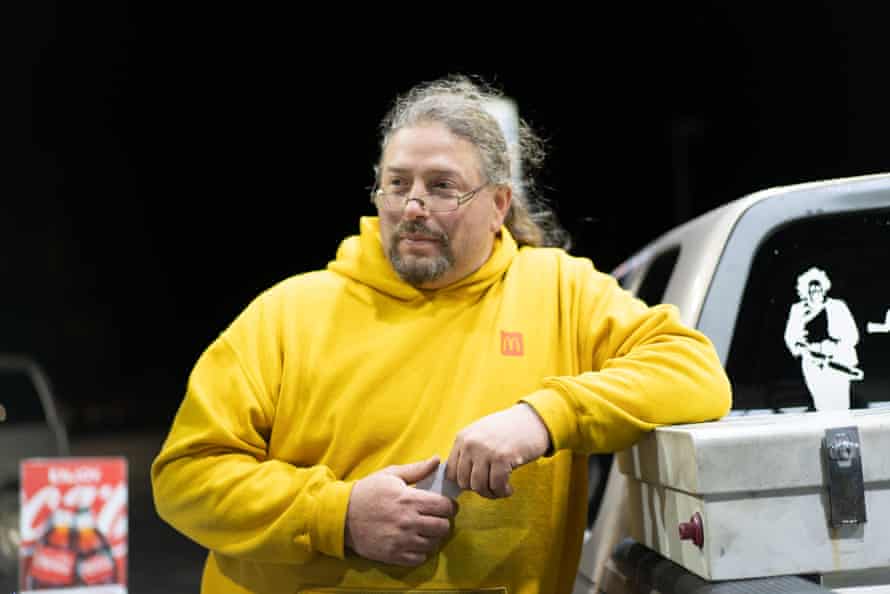
“I don’t want to go so far as to say it was stolen, but ballots were trashed and a lot of things went wrong – including here in Georgia,” said a 54-year-old legal assistant at an Atlanta corporate law firm who was walking her dog Henry in the late afternoon drizzle.
About half the people the Guardian spoke to in Monroe had been vaccinated, a figure in line with Georgia as a whole, consistently in the bottom of national rankings for vaccination rates. Graham, the Tribune editor, expressed concern over the “government forcing an experimental chemical into people’s bodies to keep them employed … If we keep going in this direction, it’s going to erode our freedoms.”
“I don’t care for masks or vaccines,” said Jason Mealer, a 38-year-old McDonald’s employee. “We had Ebola here and that was deadly. Why do something about it now? I say, just live your life.”

Jason Mealer, 38, said, ‘Trump was doing fine until they kicked him out.’
Photograph: Jesse Pratt López/The Guardian
Retiree Mark Kramer said “there’s no ingredients you can read” in Covid vaccines, and that they are “poison – they’ll cause you more disease than anything else”. No one in his family had been vaccinated, he added, pointing to a restaurant nearby where they were waiting for him. Kramer didn’t want his picture taken; his son-in-law standing nearby explained their objections: “You have BLM, antifa – you have no idea what they might do” if a photograph were to appear online.
The personal impacts of global or macroeconomic forces were also on people’s minds in downtown Monroe, without much interest in the global or macro sides of the equation. High gas prices, bottled supply chains, short staffing – consensus was, they are all due to the current administration.
“I went to Ihop and their schedule had changed to 7am to 4pm due to staff shortages,” said Holland. “People in my own town are staying at home instead of working,” she said. “Biden is paying people to stay home.”
The notion that radical changes have taken place in how students from kindergarten through grade 12 are taught about race and racism in US history – tagged as CRT or critical race theory – is not absent among Trump supporters in Monroe, where most Black and white residents live in separate parts of town to this day. CRT is an academic discipline that examines the ways in which racism operates in US laws and society. It is not taught in Georgia schools.
“I don’t agree with what’s being taught in schools,” said Holland. “Parents should have a say, and teaching kids that white people are racist is the wrong thing. It’s almost like they want to recreate history,” she said.
“Bringing in CRT is not what teaching is all about,” she said. “Preparing for college, for the real world, is what it’s about. Not about race, or anything else.”
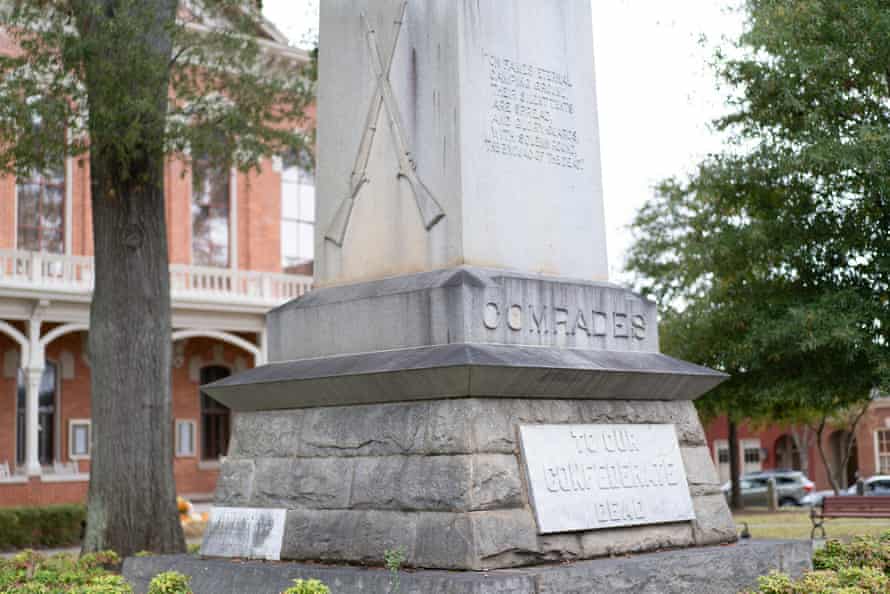
Retiree Mark Kramer said “there’s no ingredients you can read” in Covid vaccines, and that they are “poison – they’ll cause you more disease than anything else”. No one in his family had been vaccinated, he added, pointing to a restaurant nearby where they were waiting for him. Kramer didn’t want his picture taken; his son-in-law standing nearby explained their objections: “You have BLM, antifa – you have no idea what they might do” if a photograph were to appear online.
The personal impacts of global or macroeconomic forces were also on people’s minds in downtown Monroe, without much interest in the global or macro sides of the equation. High gas prices, bottled supply chains, short staffing – consensus was, they are all due to the current administration.
“I went to Ihop and their schedule had changed to 7am to 4pm due to staff shortages,” said Holland. “People in my own town are staying at home instead of working,” she said. “Biden is paying people to stay home.”
The notion that radical changes have taken place in how students from kindergarten through grade 12 are taught about race and racism in US history – tagged as CRT or critical race theory – is not absent among Trump supporters in Monroe, where most Black and white residents live in separate parts of town to this day. CRT is an academic discipline that examines the ways in which racism operates in US laws and society. It is not taught in Georgia schools.
“I don’t agree with what’s being taught in schools,” said Holland. “Parents should have a say, and teaching kids that white people are racist is the wrong thing. It’s almost like they want to recreate history,” she said.
“Bringing in CRT is not what teaching is all about,” she said. “Preparing for college, for the real world, is what it’s about. Not about race, or anything else.”

A monument ‘to our Confederate dead’ has looked over downtown Monroe since 1907. Photograph: Jesse Pratt López/The Guardian
But race – and racism – is woven into Monroe’s history.
A few miles from where Holland spoke, in 1946, a mob of several dozen white people shot and lynched two Black couples, by Moore’s Ford Bridge, which crosses the Appalachee River.
The gruesome act of violence led a 17-year-old Martin Luther King Jr to write a letter to the Atlanta Journal-Constitution and President Harry Truman ordered the FBI to investigate. No one was found guilty. In an ongoing lawsuit, the 11th circuit US court of appeals ruled in March of last year that grand jury records from the case must remain sealed, keeping all of us from potentially learning what happened that day, and who was responsible.
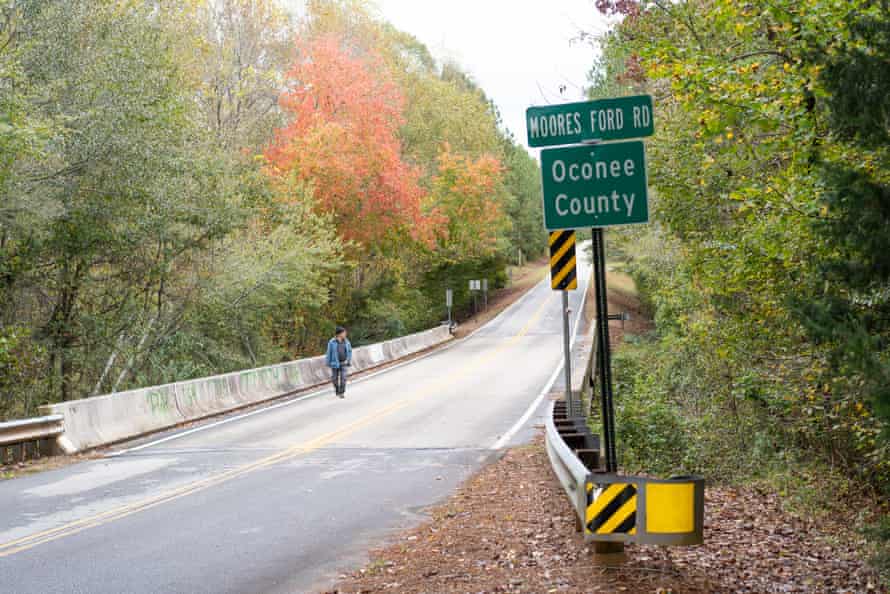 Two Black couples were lynched at Moore’s Ford Bridge, outside Monroe, Georgia, in 1946.
Two Black couples were lynched at Moore’s Ford Bridge, outside Monroe, Georgia, in 1946.
But race – and racism – is woven into Monroe’s history.
A few miles from where Holland spoke, in 1946, a mob of several dozen white people shot and lynched two Black couples, by Moore’s Ford Bridge, which crosses the Appalachee River.
The gruesome act of violence led a 17-year-old Martin Luther King Jr to write a letter to the Atlanta Journal-Constitution and President Harry Truman ordered the FBI to investigate. No one was found guilty. In an ongoing lawsuit, the 11th circuit US court of appeals ruled in March of last year that grand jury records from the case must remain sealed, keeping all of us from potentially learning what happened that day, and who was responsible.
 Two Black couples were lynched at Moore’s Ford Bridge, outside Monroe, Georgia, in 1946.
Two Black couples were lynched at Moore’s Ford Bridge, outside Monroe, Georgia, in 1946. Photograph: Jesse Pratt López/The Guardian
The Moore’s Ford lynching persists not just in the courts, and the memories of many; only two months ago, Monroe’s current mayor, John Howard, presented a statement to the town’s city council publicly acknowledging it for the first time. One Black city council member refused to sign the statement, calling it a political stunt aimed at currying favor among the town’s Black voters in Howard’s bid for re-election.
Should schools in Monroe teach children about the lynching at Moore’s Ford? If so, how? “That sort of history – though it was ghastly – should be taught,” said Jeff Blackstone, a 58-year-old who owns a company that installs hotel TV systems. “But – we have all learned from our mistakes. Although there are still some outliers who go back to the horrid ways of previous years, that should not be tolerated. And I … don’t agree with what the government is trying to do with our lives – like CRT – trying to teach us societal views.”
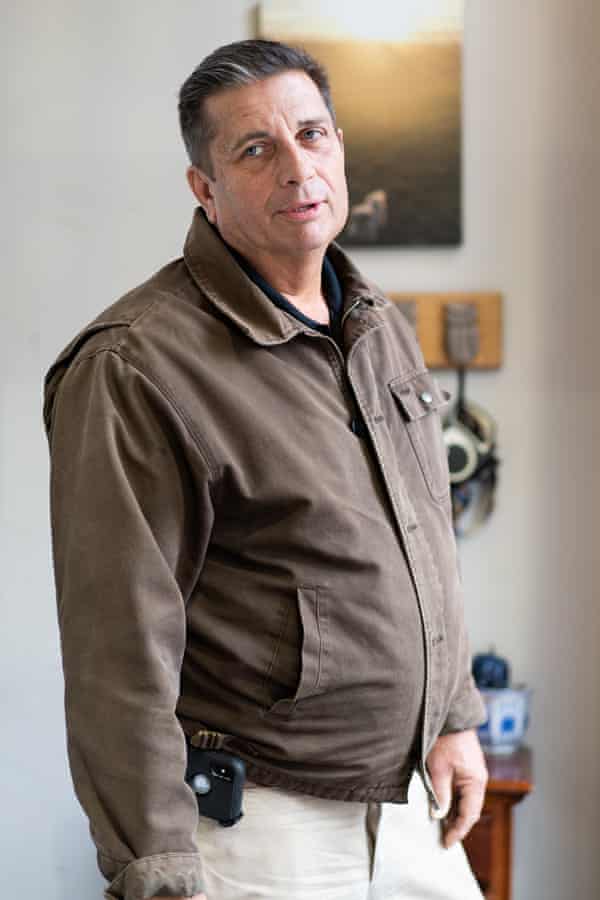
The Moore’s Ford lynching persists not just in the courts, and the memories of many; only two months ago, Monroe’s current mayor, John Howard, presented a statement to the town’s city council publicly acknowledging it for the first time. One Black city council member refused to sign the statement, calling it a political stunt aimed at currying favor among the town’s Black voters in Howard’s bid for re-election.
Should schools in Monroe teach children about the lynching at Moore’s Ford? If so, how? “That sort of history – though it was ghastly – should be taught,” said Jeff Blackstone, a 58-year-old who owns a company that installs hotel TV systems. “But – we have all learned from our mistakes. Although there are still some outliers who go back to the horrid ways of previous years, that should not be tolerated. And I … don’t agree with what the government is trying to do with our lives – like CRT – trying to teach us societal views.”

Jeff Blackstone, 58, thinks ‘we need to move beyond Black, white and brown.’ Photograph: Jesse Pratt López/The Guardian
“I think we need to move beyond Black, white and brown,” Blackstone said. “I hire and fire people and don’t judge by their color, but what they can do to help me.”
James “Trae” Welborn III, associate professor of history at Georgia College & State University, says racism and its expression has changed over time.
“Racism now takes seemingly benign forms – talk of personal liberties, colorblindness … The idea is that racism is people running around in white hoods, burning white crosses. So you say, ‘I wouldn’t do that,’ and anything that falls short of that isn’t racism.”
Welborn also pointed to the idea that racism happened a long time ago, the shared urgency among Trump supporters to “deny and marginalize the issue of race and racism, in favor of ‘the beacon of liberty and freedom’ narrative in American history”. A civil war historian, Welborn sees parallels between the views and rhetoric of Trump supporters and those of the Confederacy. “There’s even similar language – the threats of violence: ‘Come to the Capitol and give ’em what for,’” he said.
Meanwhile, in the present, many Trump supporters in Georgia are following Garland Favorito and his organization, VoterGA, which has two lawsuits in state courts tied to last year’s elections. Favorito’s organization is 15 years old and works on election integrity – a term which was then used in public discourse in reference to issues such as how to employ audit methods that could truly verify elections results, and now is mostly used to underline any supposed evidence that Trump won. Until last year, VoterGA was primarily supported by progressive Democrats. Now, Favorito receives social media followers, and donations, from thousands of Trump supporters, in Georgia and elsewhere.
As for last year’s election, he said, “the truth is, nobody knows who won. The secretary of state [in Georgia] can tell you he knows, but he has no idea.” This is because, he said, allegations of ballot stuffing have not been satisfactorily investigated by the state and a “forensic analysis” of election system servers in the state’s 159 counties has not been performed. The problem is that “nobody wants to get to the truth”.
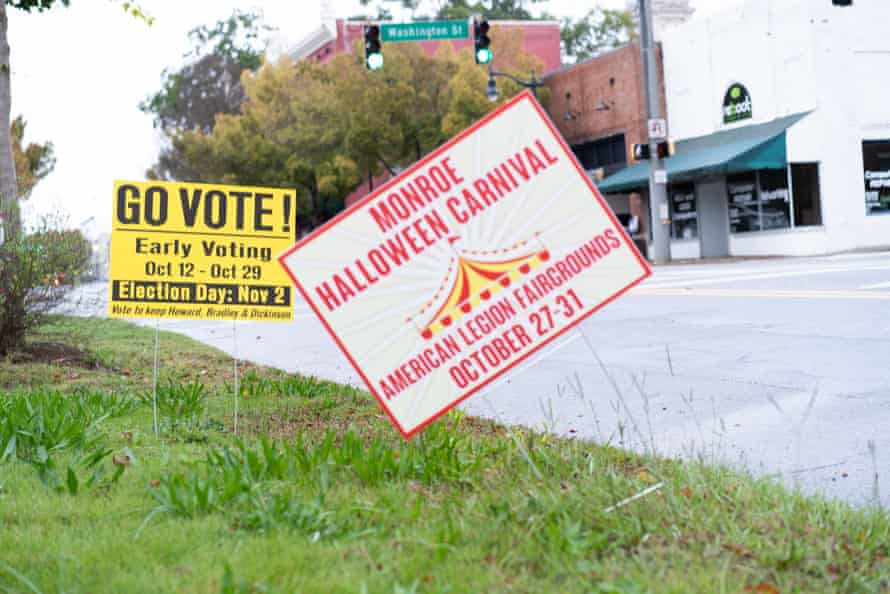
“I think we need to move beyond Black, white and brown,” Blackstone said. “I hire and fire people and don’t judge by their color, but what they can do to help me.”
James “Trae” Welborn III, associate professor of history at Georgia College & State University, says racism and its expression has changed over time.
“Racism now takes seemingly benign forms – talk of personal liberties, colorblindness … The idea is that racism is people running around in white hoods, burning white crosses. So you say, ‘I wouldn’t do that,’ and anything that falls short of that isn’t racism.”
Welborn also pointed to the idea that racism happened a long time ago, the shared urgency among Trump supporters to “deny and marginalize the issue of race and racism, in favor of ‘the beacon of liberty and freedom’ narrative in American history”. A civil war historian, Welborn sees parallels between the views and rhetoric of Trump supporters and those of the Confederacy. “There’s even similar language – the threats of violence: ‘Come to the Capitol and give ’em what for,’” he said.
Meanwhile, in the present, many Trump supporters in Georgia are following Garland Favorito and his organization, VoterGA, which has two lawsuits in state courts tied to last year’s elections. Favorito’s organization is 15 years old and works on election integrity – a term which was then used in public discourse in reference to issues such as how to employ audit methods that could truly verify elections results, and now is mostly used to underline any supposed evidence that Trump won. Until last year, VoterGA was primarily supported by progressive Democrats. Now, Favorito receives social media followers, and donations, from thousands of Trump supporters, in Georgia and elsewhere.
As for last year’s election, he said, “the truth is, nobody knows who won. The secretary of state [in Georgia] can tell you he knows, but he has no idea.” This is because, he said, allegations of ballot stuffing have not been satisfactorily investigated by the state and a “forensic analysis” of election system servers in the state’s 159 counties has not been performed. The problem is that “nobody wants to get to the truth”.

Democrat Emilio Kelly ran to unseat the incumbent mayor in Monroe – in a bid to become the town’s first Black mayor in its 200-year history. Photograph: Jesse Pratt López/The Guardian
Asked about the process followed in Arizona, where a group called Cyber Ninjas took months to review election materials from the state’s largest county – and still concluded that Joe Biden won – Favorito said that the group’s work was never really completed, because the state didn’t supply them with everything they sought to examine. This means “we will never know who won in Arizona”, he said.
Asked if it concerns him that many of the Trump supporters supporting his work in Georgia are the same people who hold positions such as the vaccine being “poison”, he said, “No, it doesn’t concern me to speak truth … Trump supporters have just as much a right to say Trump won as the secretary of state says Biden won, because we don’t know the truth.”
Asked about the process followed in Arizona, where a group called Cyber Ninjas took months to review election materials from the state’s largest county – and still concluded that Joe Biden won – Favorito said that the group’s work was never really completed, because the state didn’t supply them with everything they sought to examine. This means “we will never know who won in Arizona”, he said.
Asked if it concerns him that many of the Trump supporters supporting his work in Georgia are the same people who hold positions such as the vaccine being “poison”, he said, “No, it doesn’t concern me to speak truth … Trump supporters have just as much a right to say Trump won as the secretary of state says Biden won, because we don’t know the truth.”
No comments:
Post a Comment